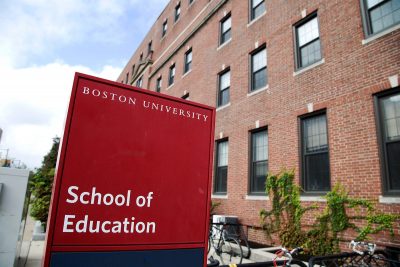
The Boston University Institute for Early Childhood Well-Being, which will research and develop new approaches to sustain young children’s health, well-being and education, is set to officially launch at a two-hour Zoom event for staff and faculty Thursday.
The Early Childhood Faculty Alliance of the Wheelock College of Education and Human Development developed the new Institute to research and transform the nurturing ecosystems of early childhood development locally and globally through collaboration with childhood researchers, scholars and providers in various disciplines.
The Institute is looking to partner with early childhood education providers, health care providers, pediatricians, food and nutrition programs, as well as other groups involved in the ecology of children’s development — which is everything involved in the healthy growth of children.
Ruth Paris, an associate professor and chair of the Clinical Practices Department in the School of Social Work, noted the importance of focusing on the growth of children — especially those at a young age — in research.
“Early childhood is a really important time of life,” Paris said. “A lot hinges on what happens in the first five years of life, probably even a lot in the first three years of life.”
Paris said education research in very young children is critical because the challenges, including mental health, housing and food security, adolescents and adults face can often be addressed earlier in development.
“You can make a huge difference in someone’s life,” she said, “if you attend to the challenges that people experience in early childhood.”
Paris said the Institute evolved from academic collaboration in 2019 that strived to create interdisciplinary work at a local and global level.
“We realized that we needed an entity on the BU campus that would bridge all of those different schools and colleges,” Paris said, “and that would pretty much foster collaboration among all of the early childhood scholars.”
Stephanie Curenton-Jolly, associate professor at Wheelock and one of the organizers for the launch, said the goal of the virtual event was forming connections between various groups by having “very brief lightning talks” before separating into smaller discussions.
“People are going to be able to share their ideas and some of their research,” Curenton-Jolly said. “Then we will break people into small breakout rooms and allow them to talk, to introduce themselves more and to think about ways that they can collaborate.”
College of Fine Arts freshman Delaney Finn, who is minoring in applied human development, said she supported the new Institute as well as research for early childhood learning.
“I think it’s a field that a lot of people underestimate and one that a lot of the academic world needs to put more research into,” Finn said. “Bringing a diverse background of researchers and educators will allow for a holistic understanding of early childhood development.”
College of Arts and Sciences sophomore Zoe Plzak said she believes the creation of the Institute was a positive decision on BU’s part.
“I think it really upholds the values of Boston University as a research institution, not only promoting the learning of our students but also learning in general,” Plzak said. “I think it’s important to be aware of how we get here in the first place.”




















































































































